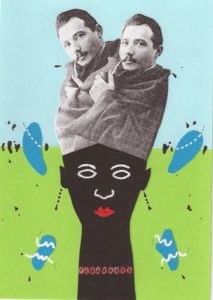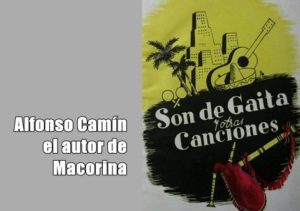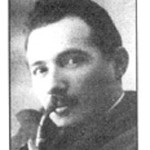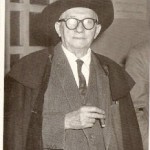If the name of Alfonso Camín does not tell you anything, Macorina will tell you … put your hand here Macorina …. His writer, the Asturian poet from Cuba, sang to the mulatto. In Cuba, he grew up as a Cuban and his vast work reflects how much he felt as Cuban. In the beginning his literary works, his journalism and the picaresque were very close, and he always had a lot of rogue with the great sense of his illustration.
Considered the artificie of Afro-Cuban poetry, which later expressed triumphantly, Carpentier, Girao and Guillén among others, Alfonso Camín, the Asturian-Cuban as he has always been considered among our intellectual circles left the original traces of his poetic and intellectual capacity in the particularities of our indigenous and Cuban realities. In Alfonso Camín that exercise carries a double motivation: its Spanish roots, and its Cuban experience. And it is necessary to make it clear that black poetry, mulatto poetry and white poetry are divisions that limit the poetic body. Alfonso Camín is the only one of the first Afro-Cuban cultivators (until 1931) who did not enter to establish criticisms, rules or aesthetic dispositions in essays or studies on the subject.
His poetry extracts that fertile sap from the feeling of this people of mixed race of our Antilles as is the Cuban people.
This is how the students of his poetry reflect it:
The black and the black in Cuba, like the mulatto and the mulatta later, were a different human production, with a differentiated expression and art, a deep human penetration, in the spiritual and in the social. The color of black and mulatto was no longer an original black: the sap of the island of Cuba had made it clear, in a grace of a different tropic, and in the tonality of those impetuous mulattoes who chanced the streets of Havana: Hill to Jesus del Monte, / from Vedado to Luyanó! In them he made Camín walk to the mulattas. How he made them dance in the countryside: when on that turkish sunrise / looked at the stream / clean Damují.
This gives Alfonso Camín the paternity of Afro-Cuban poetry.
Alfonso Camin Meana. He emigrated to Cuba at age 15 (1905), leading his youth on hard and forced roads. After having worked in a quarry of Contrueces, when he arrived in Cuba, where he stayed until 1914 when he returned to Spain as a journalist for the “Diario de la Marina” to cover the First World War. During his stay in Cuba, he became editor of the newspaper “La Noche”, as well as other newspapers in Havana and Santiago de Cuba. He directs the magazine “Apolo” and is editor of the Diario de la Marina.
An energetic poet, self-taught, he published his first collection of poems (“Adelfas”) in 1913 in Havana. He returned to Spain in 1916 to return to Cuba intermittently until 1933.
Alfredo Camin is the father of Afro-Cuban poetry, and a high representative of Mexican poetry. He published 77 books between 1913 and 1967. Of these there are 53 poems, as well as genres such as the novel, the short story, the essay and journalism. In Cuba, his poetic cadence was born, influenced by the lyrical airs of the Island, its music and the sensuality of miscegenation.
In “La Negra Panchita” (see above), the initial topics of Afro-Cuban aesthetics are present, together with the stereotypes inherited from Cuban costumbrismo and criollismo: black slang; the sensuality, movement and eroticism of the black woman; the black brave and brave but also suffered, and loving; slavery; the rumba, the son; the drum; the Santeria; the Asturian, the Chinese; the Spanish bodeguero, the geography, the nature and Cuban fauna; the Cuban street and the solar; the Viper; the sugar mill and the cane; the batey, Cuban cuisine, Cuban clothing; and the atmosphere of rumba, party and revelry.
Also in Mexico he left his mark, which bears the accent of the American Indian and the magic of his colors. Camín’s poetic work is the great nexus of Spanish poetry with America.
Some of his texts were musicalized, such as the zarzuela La pícara molinera, by maestro Luna, inspired by La Carmona de Camín; Chavela Vargas made the spicy Cuban “Macorina” immortal with her voice and her music. Music and poetry so as not to forget the singer of Asturian essences and the friend of two worlds and three countries.
The influences of José Martí, the father of the Cuban nation, politician, philosopher and poet, in the work of Camín are notorious, and precisely the José Martí Cultural Foundation is going to organize cultural acts of vindication of the Asturian poet. «The objective is to return Camín to Cuba». As the president of the association Alfredo Camin declares.
Alfonso Camin, the Poet of Asturias died, after receiving the recognition and admiration of his countrymen, on December 12, 1982. His remains rest in the cemetery of San Felix, in Porceyo (Gijón).
As Cubans we join the tributes to those who in their works sang to our countryside, to our women and men. There are a total of 102 poems that run through a vital chronology, but also the different poetic “palos” that he played, his fertile Cuban and Mexican stages, his songs to Asturias, but also to other Spanish regions, or his poetry to war.
EL PADRE DE LA POESÍA AFRO-CUBANA, ALFONSO CAMÍN.
Si el nombre de Alfonso Camín no te dice nada, Macorina si te dirá … ponme la mano aqui Macorina…. Su escritor, el poeta asturiano cubano cantó a la mulata. En Cuba creció como un cubano más y su basta obra refleja en que medida sentía como cubano. En sus inicios sus trabajos literarios, su periodismo y lo picaresco estaban muy próximos, y él tuvo siempre mucho de pícaro con el genial sentido de su ilustración.
Considerado el artificie de la poesia afrocubana, que mas tarde expresaran triunfalmente, Carpentier, Girao y Guillén entre otros, Alfonso Camín, el asturiano-cubano como se le ha considerado siempre entre nuestros circulos intelectuales dejó las huellas originales de su capacidad poetica e intelectual en las particularidades de nuestras realidades autoctonas como cubanos. En Alfonso Camín ese ejercicio lleva una motivación doble: su raíz española, y su vivencia cubana. Y es necesario dejar asentando que la poesía negra, poesía mulata y poesía blanca son divisiones que limitan el cuerpo poético. Alfonso Camín es el único de los primeros cultivadores de lo afrocubano (hasta 1931) que no entró a establecer críticas, reglas o disposiciones estéticas en ensayos o estudios al respecto.
Su poesia extrae esa savia fecunda del sentir de ese pueblo de raza mezclada de nuestras antillas como es el pueblo cubano.
Es asi como los estudiosos de su poesia lo reflejan:
El negro y la negra en Cuba, como el mulato y la mulata después, eran una producción humana distinta, con una expresión y un arte diferenciado, una penetración humana profunda, en lo espiritual y en lo social. El color del negro como del mulato no eran ya un negro original: la savia de la isla de Cuba lo había clareado, en una gracia de un trópico distinto, y en la tonalidad de aquellas impetuosas mulatas que chancleteaban las calles de La Habana: del Cerro a Jesús del Monte,/del Vedado a Luyanó! En ellas hizo pasear Camín a las mulatas. Como las hizo danzar en la campiña: cuando en aquel amanecer turquí/ miraba en la corriente/ limpia del Damují.
Esto le concede a Alfonso Camín la paternidad de la poesía afrocubana.
Alfonso Camin Meana. Emigró a Cuba a los 15 años (1905), llevando su juventud por caminos duros y forzosos. Tras haber trabajado en una cantera de Contrueces, al llegar a Cuba, donde estuvo hasta 1914 cuando regresa a España como periodista del “Diario de la Marina” para cubrir la Primera Guerra Mundial. Durante su estancia en Cuba llega a ser redactor del periódico “La Noche”, así como de otros diarios habaneros y de Santiago de Cuba. Dirige la revista “Apolo” y es redactor del Diario de la Marina.
Poeta enérgico, autodidacta, publicó su primer poemario (“Adelfas”) en 1913 en La Habana. Regresó a España en 1916 para volver a Cuba de forma intermitente hasta 1933.
Alfredo Camin es el padre de la poesía afrocubana, y alto representante de la poesía mexicana. Publicó 77 libros entre 1913 y 1967. De ellos hay 53 poemarios, además de géneros como la novela, el cuento, el ensayo y el periodismo. En Cuba nació su cadencia poética influida por los aires líricos de la Isla, su música y la sensualidad del mestizaje.
En “La Negra Panchita” (ver arriba) están presentes los tópicos iniciales de la estética afrocubana, unidos a los tópicos heredados del costumbrismo y criollismo cubano: la jerga negra; la sensualidad, movimiento y erotismo de la negra; el negro valiente y aguerrido pero también sufrido, y amoroso; la esclavitud; la rumba, el son; el tambor; la Santería; el asturiano, el chino; el bodeguero español, la geografía, la naturaleza y fauna cubana; la calle cubana y el solar; la culebra; el ingenio azucarero y la caña; el batey, la gastronomía cubana, la vestimenta cubana; y el ambiente de rumba, fiesta y jolgorio.
Chavela canta Macorina de Alfonso Camín.
Tambien en México dejó su marca, que lleva el acento del indio americano y la magia de sus colores.La obra poética de Camín es el gran nexo de la poesía española con América.
Algunos de sus textos fueron musicalizados, como la zarzuela La pícara molinera, del maestro Luna, inspirada en La Carmona de Camín; Chavela Vargas hizo inmortal con su voz y su música la picante cubana “Macorina”. Música y poesía para no olvidar al cantor de las esencias asturianas y al amigo de dos mundos y tres patrias.
Las influencias de José Martí, el padre de la nación cubana, político, filósofo y poeta, en la obra de Camín son notorias, y precisamente la Fundación Cultural José Martí va a organizar actos culturales de reivindicación del poeta asturiano. «El objetivo es devolver Camín a Cuba». Como declara el presidente de la asociacion Alfredo Camin.
Alfonso Camin, el Poeta de Asturias murió, tras recibir el reconocimiento y admiración de sus paisanos, el 12 de diciembre de 1982. Sus restos reposan en el cementerio de San Félix, en Porceyo (Gijón).
Como cubanos nos sumamos a los homenajes a quien en sus obras cantó a nuestra campiña, a nuestra mujeres y hombres. Son en total 102 poemas que recorren toda una cronología vital, pero también los distintos «palos» poéticos que tocó, sus fértiles etapas cubana y mexicana, sus cantos a Asturias, pero también a otras regiones españolas, o sus poesías a la guerra.
Agencies/Wiki/Puertodan/Ine.es/Internet Photos/Excerpts/ Arnoldo Varona/ theCubanHistory.com
THE CUBAN HISTORY, HOLLYWOOD.










